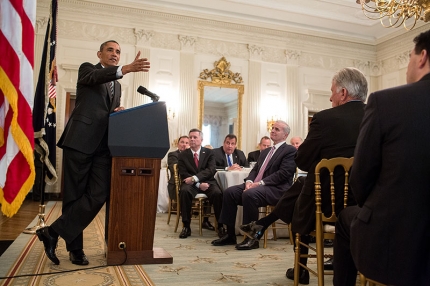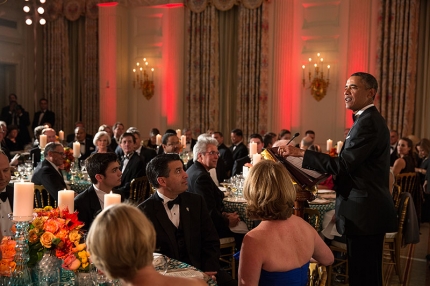President Obama to Governors: I Look Forward to Working with You to Reignite America's Economic Engine
In a meeting with the National Governors Association today at the White House, President Obama stressed the need for bipartisan cooperation, and pressed the leaders in attendance to work together with their partners in Washington to put the focus back on the next generation, rather than the next election.
All of us are elected officials. All of us are concerned about our politics, both in our own party’s as well as the other party’s. But at some point, we've got to do some governing. And certainly what we can't do is keep careening from manufactured crisis to manufactured crisis. As I said in the State of the Union, the American people have worked hard and long to dig themselves out of one crisis; they don't need us creating another one. And unfortunately, that's what we've been seeing too much out there.
The American people are out there every single day, meeting their responsibilities, giving it their all to provide for their families and their communities. A lot of you are doing the same things in your respective states. Well, we need that same kind of attitude here in Washington. At the very least, the American people have a right to expect that from their representatives.
The President and First Lady hosted a dinner for the governors on Sunday at the White House, and on Monday the leaders gathered again to hear from Mrs. Obama and Dr. Biden, as well as the President and Vice President. At both events, the focus was on the progress we can and do make when elected officials work together to find smart, common-sense solutions to the challenges that face us as a nation, from recovering from national disasters like Hurricane Sandy to continuing to rebuild our economy after the 2008 crash.
Both Vice President Biden and President Obama discussed the need for Congress to take action to prevent painful automatic budget that will be felt on the ground in states across the nation beginning March 1. The President also talked about some important areas where governors are making strides that can be replicated across the country, including infrastructure and education:
I know that one of the biggest hurdles that you face when it comes to fixing infrastructure is red tape. And oftentimes, that comes out of Washington with regulations. In my first term, we started to take some steps to address that. And we’ve shaved months -- in some cases, even years -- off the timeline of infrastructure projects across America.
So today, I’m accelerating that effort. We’re setting up regional teams that will focus on some of the unique needs each of you have in various parts of the country. We’re going to help the Pacific Northwest move faster on renewable energy projects. We’re going to help the Northeast Corridor move faster on high-speed rail service. We’re going to help the Midwest and other states, like Colorado, move faster on projects that help farmers deal with worsening drought. We’re going to help states like North Dakota and South Dakota and Montana move faster on oil and gas production. All of these projects will get more Americans back to work faster. And we can do even more if we can get Congress to act.
The second priority that I want to talk about is education -- and in particular, education that starts at the earliest age. I want to partner with each of you to make high-quality preschool available to every child in America.
Now, this is an area where we've already seen great bipartisan work at the state level. I was just in Governor Deal’s state to highlight this issue because Georgia has made it a priority to educate our youngest kids. And in the school district where I visited in Decatur, Georgia, you're already seeing closing of the achievement gap. Kids who are poor are leveling up. And everybody is seeing real improvement, because it's high-quality, early childhood education.
Study after study shows that the sooner children begin to learn in these high-quality settings, the better he or she does down the road, and we all end up saving money. Unfortunately, today fewer than three in 10 four-year-olds are enrolled in a high-quality preschool program. Most middle-class parents can’t afford a few hundred bucks a week in additional income for these kinds of preschool programs. And poor kids, who need it most, lack access. And that lack of access can shadow them for the rest of their lives. We all pay a price for that.
Every dollar we invest in early childhood education can save more than seven dollars later on -- boosting graduation rates, reducing teen pregnancy, even reducing incidents of violent crime.
Learn more:
What you need to know about President Obama's plan to make high-quality pre-K available to every child in America
What you need to know about President Obama's plan to revitalize American manufacturing
Find out more about the 2013 State of the Union
White House Blogs
- The White House Blog
- Middle Class Task Force
- Council of Economic Advisers
- Council on Environmental Quality
- Council on Women and Girls
- Office of Intergovernmental Affairs
- Office of Management and Budget
- Office of Public Engagement
- Office of Science & Tech Policy
- Office of Urban Affairs
- Open Government
- Faith and Neighborhood Partnerships
- Social Innovation and Civic Participation
- US Trade Representative
- Office National Drug Control Policy
categories
- AIDS Policy
- Alaska
- Blueprint for an America Built to Last
- Budget
- Civil Rights
- Defense
- Disabilities
- Economy
- Education
- Energy and Environment
- Equal Pay
- Ethics
- Faith Based
- Fiscal Responsibility
- Foreign Policy
- Grab Bag
- Health Care
- Homeland Security
- Immigration
- Innovation Fellows
- Inside the White House
- Middle Class Security
- Open Government
- Poverty
- Rural
- Seniors and Social Security
- Service
- Social Innovation
- State of the Union
- Taxes
- Technology
- Urban Policy
- Veterans
- Violence Prevention
- White House Internships
- Women
- Working Families
- Additional Issues



